人教版(2019) 选择性必修第一册 Unit 4 Body Language 单词课件-(41张PPT)
文档属性
| 名称 | 人教版(2019) 选择性必修第一册 Unit 4 Body Language 单词课件-(41张PPT) |

|
|
| 格式 | pptx | ||
| 文件大小 | 966.5KB | ||
| 资源类型 | 教案 | ||
| 版本资源 | 人教版(2019) | ||
| 科目 | 英语 | ||
| 更新时间 | 2022-12-09 09:11:43 | ||
图片预览

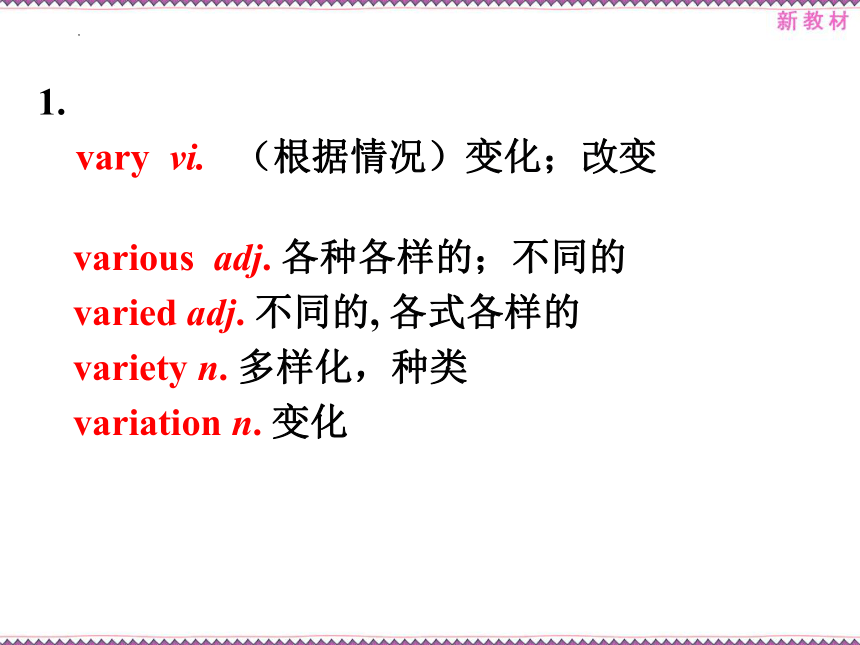
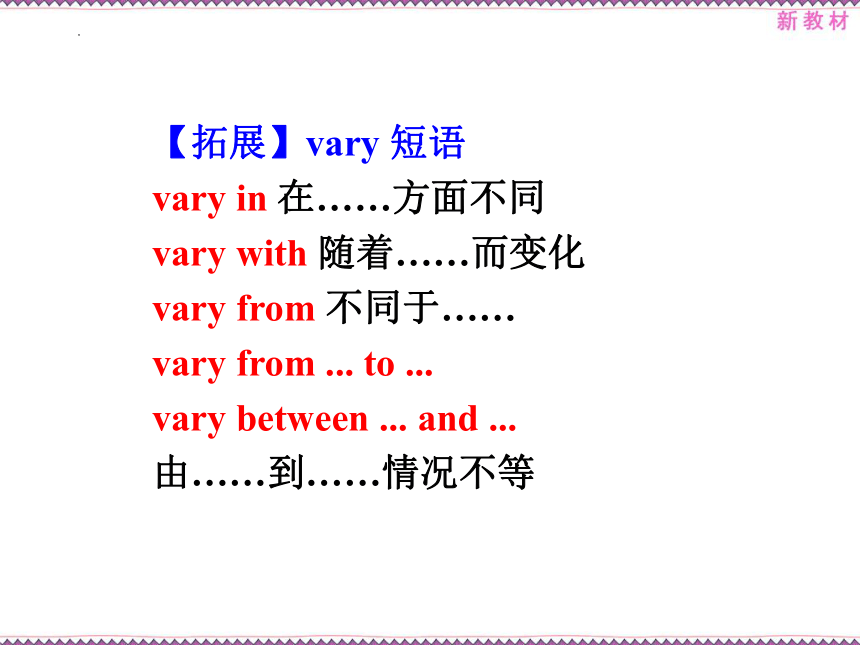
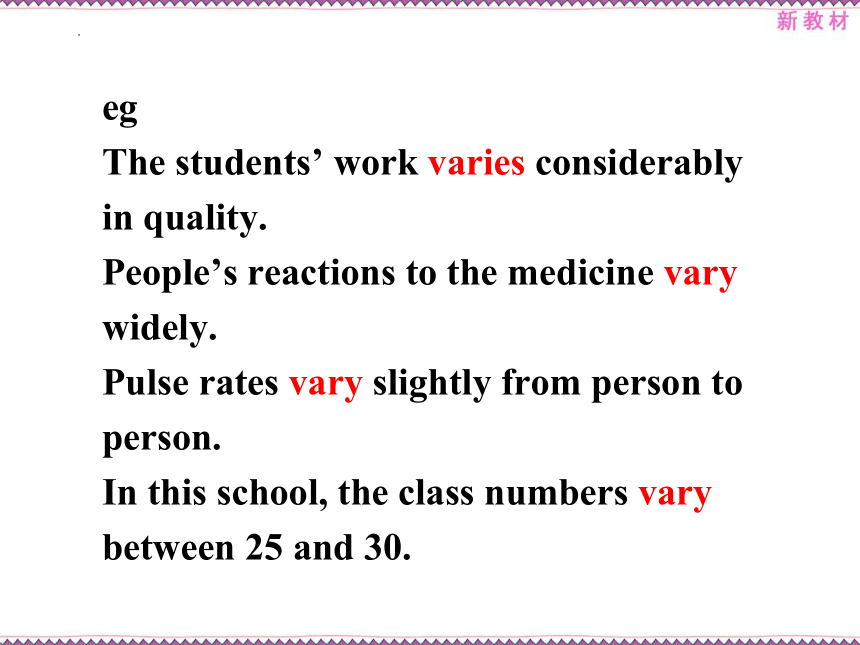
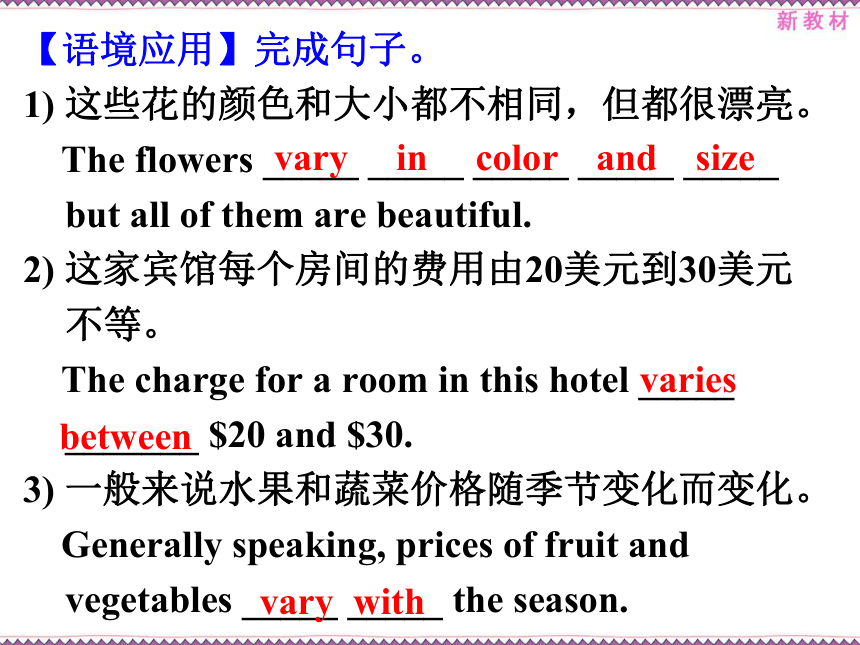
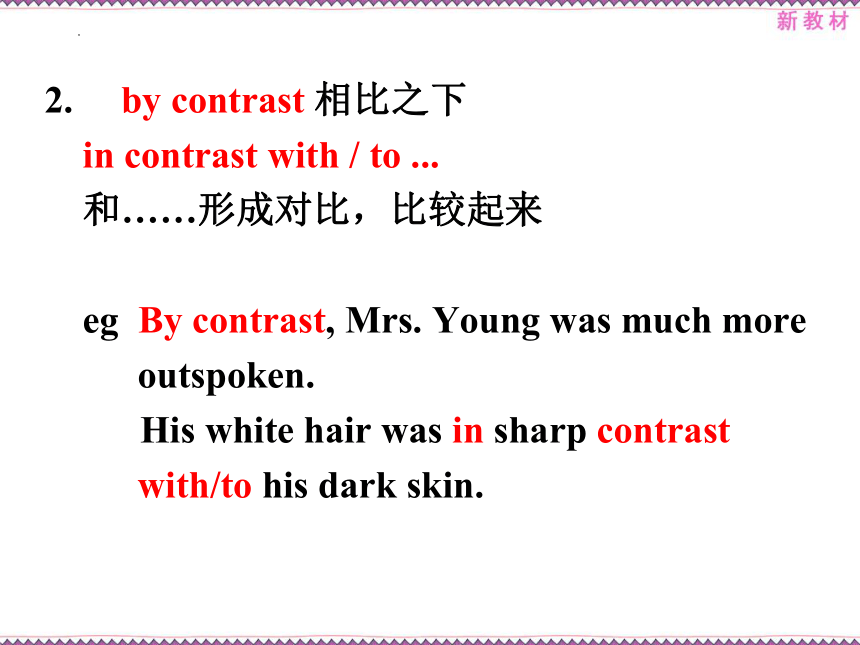
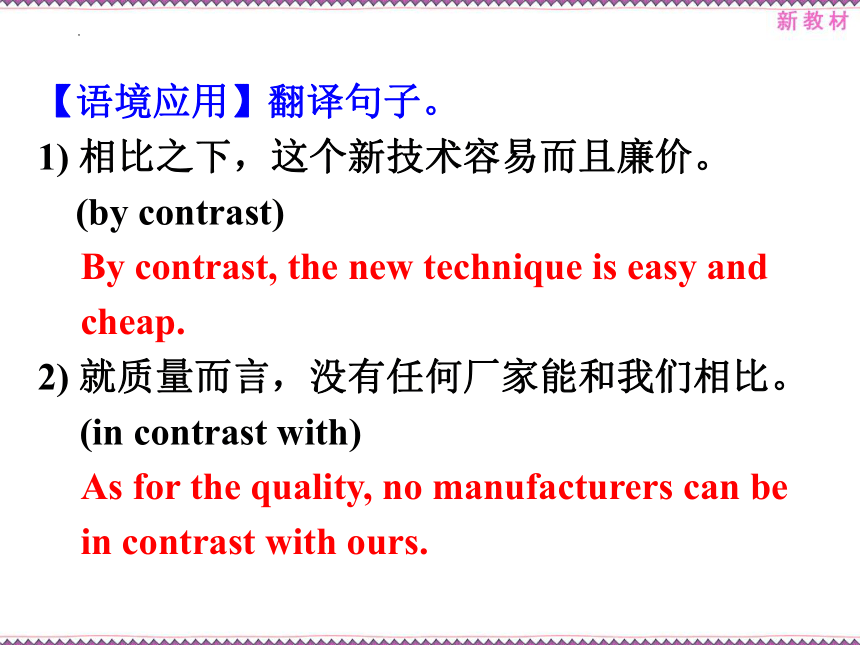
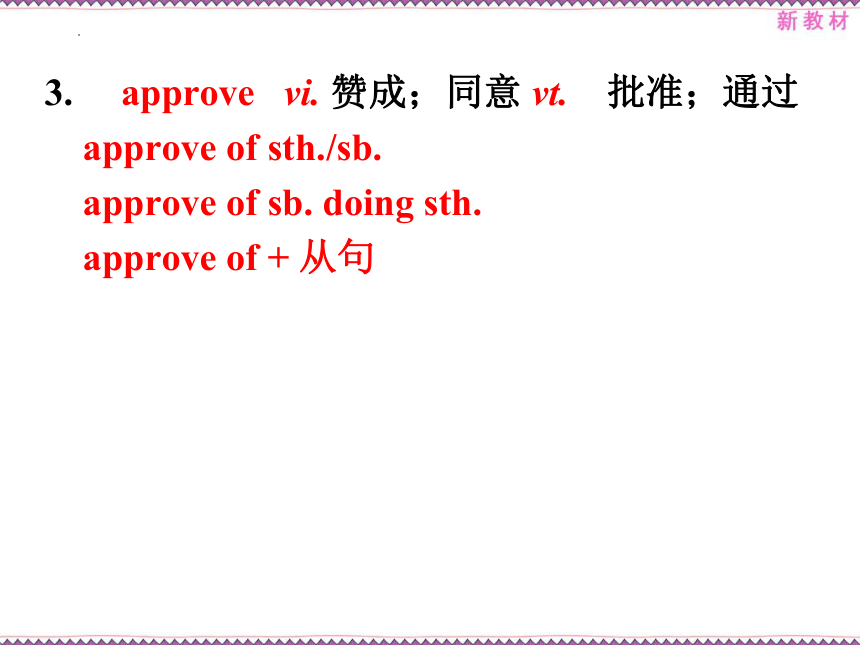

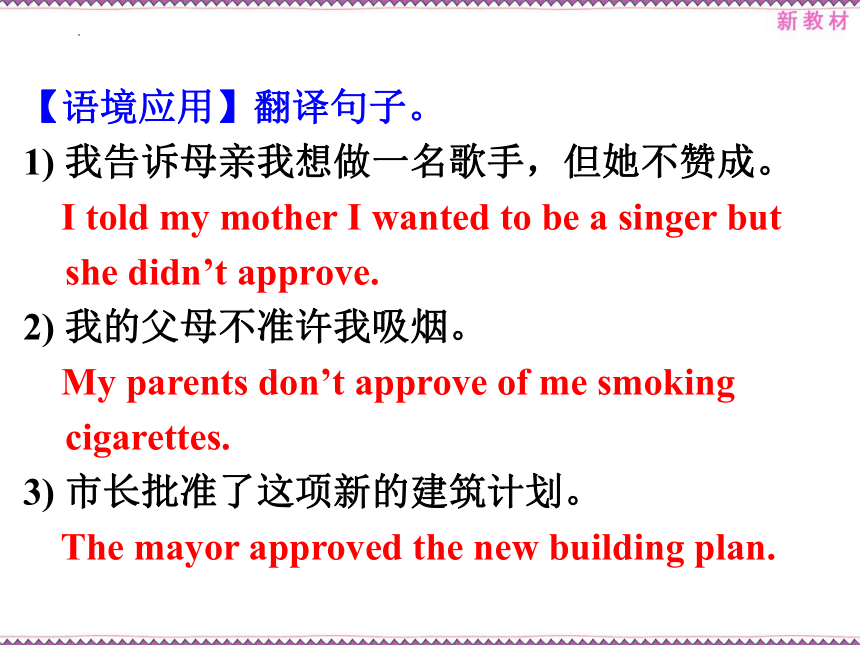
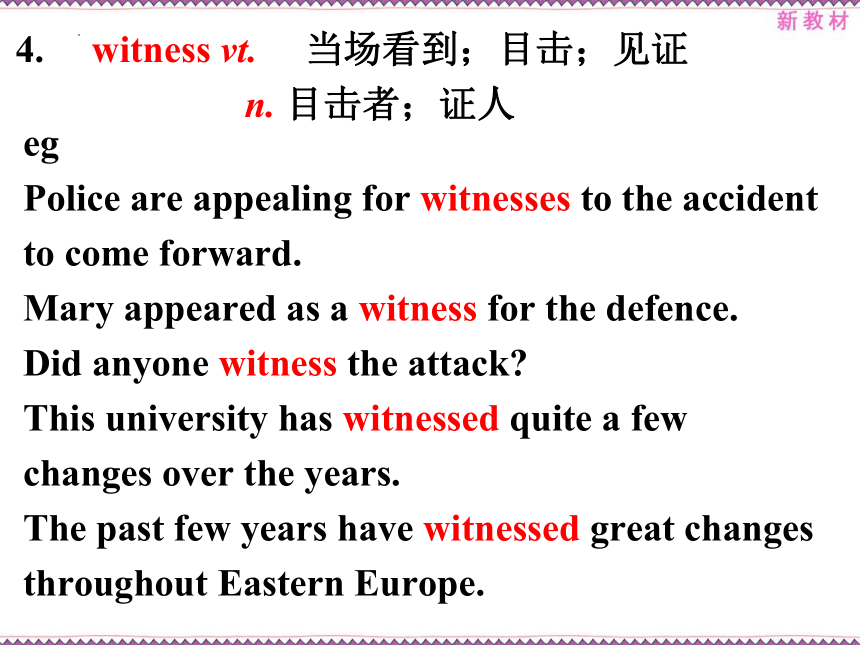
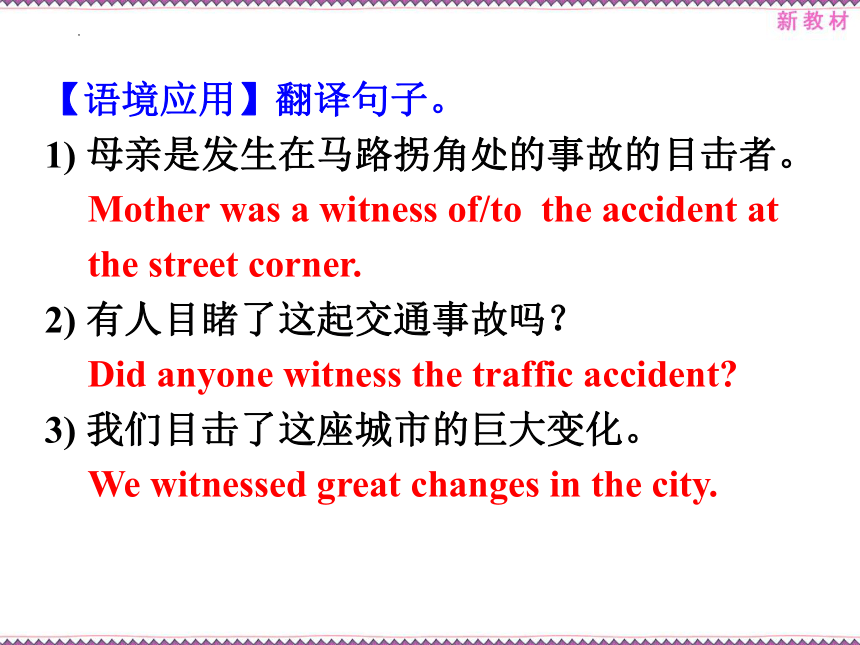
文档简介
(共41张PPT)
1.
vary vi. (根据情况)变化;改变
various adj. 各种各样的;不同的
varied adj. 不同的, 各式各样的
variety n. 多样化,种类
variation n. 变化
【拓展】vary 短语
vary in 在……方面不同
vary with 随着……而变化
vary from 不同于……
vary from ... to ...
vary between ... and ...
由……到……情况不等
eg
The students’ work varies considerably in quality.
People’s reactions to the medicine vary widely.
Pulse rates vary slightly from person to person.
In this school, the class numbers vary between 25 and 30.
【语境应用】完成句子。
1) 这些花的颜色和大小都不相同,但都很漂亮。
The flowers _____ _____ _____ _____ _____ but all of them are beautiful.
2) 这家宾馆每个房间的费用由20美元到30美元不等。
The charge for a room in this hotel _____ _______ $20 and $30.
3) 一般来说水果和蔬菜价格随季节变化而变化。
Generally speaking, prices of fruit and vegetables _____ _____ the season.
vary in color and size
varies
between
vary with
2. by contrast 相比之下
in contrast with / to ...
和……形成对比,比较起来
eg By contrast, Mrs. Young was much more outspoken.
His white hair was in sharp contrast with/to his dark skin.
【语境应用】翻译句子。
1) 相比之下,这个新技术容易而且廉价。
(by contrast)
2) 就质量而言,没有任何厂家能和我们相比。 (in contrast with)
By contrast, the new technique is easy and cheap.
As for the quality, no manufacturers can be in contrast with ours.
3. approve vi. 赞成;同意 vt. 批准;通过
approve of sth./sb.
approve of sb. doing sth.
approve of + 从句
eg
He seemed to approve of my choice.
You’ve never approved of Henry, have you
He doesn’t approve of me leaving school this year.
I approve of what the government is doing.
The government has approved a program of economic reforms.
The course is approved by the Department for Education.
【语境应用】翻译句子。
1) 我告诉母亲我想做一名歌手,但她不赞成。
I told my mother I wanted to be a singer but she didn’t approve.
2) 我的父母不准许我吸烟。
My parents don’t approve of me smoking cigarettes.
3) 市长批准了这项新的建筑计划。
The mayor approved the new building plan.
eg
Police are appealing for witnesses to the accident to come forward.
Mary appeared as a witness for the defence.
Did anyone witness the attack
This university has witnessed quite a few changes over the years.
The past few years have witnessed great changes throughout Eastern Europe.
4. witness vt. 当场看到;目击;见证
n. 目击者;证人
【语境应用】翻译句子。
1) 母亲是发生在马路拐角处的事故的目击者。
2) 有人目睹了这起交通事故吗?
3) 我们目击了这座城市的巨大变化。
Mother was a witness of/to the accident at the street corner.
Did anyone witness the traffic accident
We witnessed great changes in the city.
5. employ vt.使用;应用;雇佣
employee n. 受雇者,雇工,雇员
employer n. 雇用者,雇主
employment n. 雇用
employ sb. as ... 雇用某人作为……
employ sb. to do sth. 雇用某人做某事
be employed in (doing) sth. 从事于(做)某事
【语境应用】翻译句中的画线部分。
1) Arts agencies employ more than 10,000 people as part-time employees. __________
2) Bertocchini agrees and hopes her team’ s findings might one day help employ the enzyme to break down plastics in landfills.
__________
3) More than 750,000 have graduated, with many seeking employment in engineering, medicine. __________
雇用
使用
寻求就业
6. differ vi. 相异;不同于;有异议,有分歧
different adj. 不同的,有区别的
difference n. 差异,不同
make a/no difference (to ...)
(对……)有/没有影响
eg
My brother differs from me in many ways.
John differs with his brother about/on/over the best way to cook fish.
Emily is completely different from her sister.
Whatever she did, it made no difference.
It won’t make much difference whether
you go today or tomorrow.
【语境应用】完成句子。
1) 你的支持对我有影响。
Your support will make a difference to me.
2) Mary在许多方面与我不同。
Mary differs from me in many ways.
3) Jack和他的父亲对教育问题持不同看法。
Jack differed with his father about/on/over education.
7. comparison n. 比较
compare v. 对比;比作;相比,比得上
by/in comparison 比较起来
make a comparison 作比较
in comparison with 与……相比
eg
Does his latest novel compare with his first one
He was a loud friendly man. In comparison, his brother was rather shy.
After months of living in a tropical climate, Spain seemed cool by comparison.
You can't make a comparison between American and Japanese schools – they're too different.
【语境应用】翻译句子。
1) 诗人经常把人生比作一条河。(compare)
Poets often compare man’s life to a river.
2) 和欧洲其他国家相比较,英国的汽车价格非常高。(by comparison)
By comparison with other European countries, car prices in the UK are very high.
8. favor n. 帮助;恩惠;赞同
vt. 较喜欢;选择;有利于
【拓展】
ask a favor of sb. = ask sb. a favor
求某人帮忙
do sb. a favor 帮某人忙
in favor of 赞同,支持
in sb.’s favor 有助于某人
eg
He hired John as a favor to his father.
The idea may find favor with older people.
As an examiner, she showed no favor to any candidate.
The mother certainly favored her eldest son.
I shall favor neither side in this election.
Crowded conditions favor the spread of disease.
【语境应用】完成句子。
1) Could you _____________ (帮我一个忙) and turn off the light
2) In their discussion, I was ____________ (支持) Mr. Li.
3) The current economy ____________ the development of small businesses.
当前经济对小企业的发展不利。
do me a favor/
do a favor for me
in favor of
does not favor
9. break down 消除;分解;打破;(机器等)坏了;(身体)垮了
【拓展】break短语
break into 强行进入;打断
break off 中断
break out 突发,爆发
break through 突破,突围
break up 打碎,分裂
eg
The police broke the door down in order to save the girl in the room.
Each lesson is broken down into several parts.
My car broke down on my way home.
We can’t have you breaking down in health.
【语境应用】完成句子。
1) The thieves _________________ and stole some money.
小偷闯入办公室,偷了一些钱。
2) Negotiations between the two sides ________________.
双方谈判失败了。
broke into the office
have broken down
3) Scientists think they are beginning to _____________ in the fight against cancer.
科学家认为他们在对抗癌症的研究中开始有所突破。
4) I was still living in London when the war ____________.
战争爆发的时候我还住在伦敦。
5) In order to understand the sentence better, you must ____________ into parts.
为了更好地理解这个句子,你必须把它分成几部分。
break through
broke out
break it down
10.
tendency n. “倾向”
tend v.
tend to do
have a tendency to do
【语境应用】汉译英。
我工作累了时就容易出错。
I have a tendency to make mistakes when I am tired from work.
11.
occupy vt. “①占据(空间);②占用(时间);③侵占,占领;④担任(某职)”。
【拓展】
occupy sb. / oneself in / with doing sth., occupy sb. / oneself with sth. 忙着(做某事),忙于(某事)。
如:
Workmen are occupied in / with pulling down the house.工人们正忙着拆除房子。
如:
The piano occupies a lot of space.
钢琴占了很大的空间。
The dinner and speeches occupied more than three hours.
晚餐和演讲占用了三个多小时。
The region was quickly occupied by foreign troops.
该地区很快被外国军队占领。
My neighbor occupied an important position in the government.
我邻居在政府中担任重要的职位。
12. 【辨析】stare, glance & glare
★ stare “凝视,盯着”,指由于好奇、惊讶
、赞叹等原因长时间地注视。如:
Don’t stare at people like that; it’s rude.
别那样盯着人看,那样很粗鲁。
★ glance “ (粗略地、随便地)一瞥,看一眼
”。如:
I just glance at the headlines in the
newspaper because of the limited time.
由于时间有限,我只是浏览了一下报纸的头
条。
★ glare“怒目而视”,强调怀有敌意或在气
愤的情绪下看。如:
They stopped arguing and glared at each
other.
他们停止争吵,互相怒视。
13.
distinguish v.
“区别,辨别”
常用结构:
distinguish A from B;
distinguish between A and B
如:
The twins are so alike that no one can distinguish one from the other.
这对双胞胎长得很像,谁也分不清谁是谁。
At what age are children able to distinguish between right and wrong
孩子们在多大的年纪才能分辨是非?
14.
embarrassed adj. “感到尴尬的,感到难堪的”
embarrassing adj. “使人尴尬的,使人难堪的”,embarrassment n. 困窘;尴尬;使发窘的人或事。
[语境应用] 用embarrass的适当形式完成下列句子。
1) I felt ___________ about my dirty shoes.
2) To her _____________, she couldn’t
remember his name.
3) Shy and ___________, the boy rushed out
of the room.
4) I don’t like making speeches in public; it’s
so ____________.
embarrassed
embarrassment
embarrassed
embarrassing
15. bother vi.
①打扰,麻烦(常见搭配:bother sb. with sth.);②费事,烦心(后接with / about引起的短语或不定式)。
如:
Don’t bother your father when he’s working.
你父亲工作时不要打扰他。
I didn’t want to bother her with work matters on her day off.
我不想在她休假的时候因为工作问题打扰她。
She never bothered with / about clothes.
她从不为衣服烦恼。
Don’t bother to answer this note.
别费心回答这个问题。
16. at work “在上班;在工作”,但是在这句话中,表示“起着某一特定影响或作用”。如:
You can’t find my parents at home now. They’re at work.
你现在在家找不着我爸妈的,因为他们上班去了。
With your antivirus software at work, your computer is well protected.
有杀毒软件发挥作用,你的电脑受到了很好的保护。
1.
vary vi. (根据情况)变化;改变
various adj. 各种各样的;不同的
varied adj. 不同的, 各式各样的
variety n. 多样化,种类
variation n. 变化
【拓展】vary 短语
vary in 在……方面不同
vary with 随着……而变化
vary from 不同于……
vary from ... to ...
vary between ... and ...
由……到……情况不等
eg
The students’ work varies considerably in quality.
People’s reactions to the medicine vary widely.
Pulse rates vary slightly from person to person.
In this school, the class numbers vary between 25 and 30.
【语境应用】完成句子。
1) 这些花的颜色和大小都不相同,但都很漂亮。
The flowers _____ _____ _____ _____ _____ but all of them are beautiful.
2) 这家宾馆每个房间的费用由20美元到30美元不等。
The charge for a room in this hotel _____ _______ $20 and $30.
3) 一般来说水果和蔬菜价格随季节变化而变化。
Generally speaking, prices of fruit and vegetables _____ _____ the season.
vary in color and size
varies
between
vary with
2. by contrast 相比之下
in contrast with / to ...
和……形成对比,比较起来
eg By contrast, Mrs. Young was much more outspoken.
His white hair was in sharp contrast with/to his dark skin.
【语境应用】翻译句子。
1) 相比之下,这个新技术容易而且廉价。
(by contrast)
2) 就质量而言,没有任何厂家能和我们相比。 (in contrast with)
By contrast, the new technique is easy and cheap.
As for the quality, no manufacturers can be in contrast with ours.
3. approve vi. 赞成;同意 vt. 批准;通过
approve of sth./sb.
approve of sb. doing sth.
approve of + 从句
eg
He seemed to approve of my choice.
You’ve never approved of Henry, have you
He doesn’t approve of me leaving school this year.
I approve of what the government is doing.
The government has approved a program of economic reforms.
The course is approved by the Department for Education.
【语境应用】翻译句子。
1) 我告诉母亲我想做一名歌手,但她不赞成。
I told my mother I wanted to be a singer but she didn’t approve.
2) 我的父母不准许我吸烟。
My parents don’t approve of me smoking cigarettes.
3) 市长批准了这项新的建筑计划。
The mayor approved the new building plan.
eg
Police are appealing for witnesses to the accident to come forward.
Mary appeared as a witness for the defence.
Did anyone witness the attack
This university has witnessed quite a few changes over the years.
The past few years have witnessed great changes throughout Eastern Europe.
4. witness vt. 当场看到;目击;见证
n. 目击者;证人
【语境应用】翻译句子。
1) 母亲是发生在马路拐角处的事故的目击者。
2) 有人目睹了这起交通事故吗?
3) 我们目击了这座城市的巨大变化。
Mother was a witness of/to the accident at the street corner.
Did anyone witness the traffic accident
We witnessed great changes in the city.
5. employ vt.使用;应用;雇佣
employee n. 受雇者,雇工,雇员
employer n. 雇用者,雇主
employment n. 雇用
employ sb. as ... 雇用某人作为……
employ sb. to do sth. 雇用某人做某事
be employed in (doing) sth. 从事于(做)某事
【语境应用】翻译句中的画线部分。
1) Arts agencies employ more than 10,000 people as part-time employees. __________
2) Bertocchini agrees and hopes her team’ s findings might one day help employ the enzyme to break down plastics in landfills.
__________
3) More than 750,000 have graduated, with many seeking employment in engineering, medicine. __________
雇用
使用
寻求就业
6. differ vi. 相异;不同于;有异议,有分歧
different adj. 不同的,有区别的
difference n. 差异,不同
make a/no difference (to ...)
(对……)有/没有影响
eg
My brother differs from me in many ways.
John differs with his brother about/on/over the best way to cook fish.
Emily is completely different from her sister.
Whatever she did, it made no difference.
It won’t make much difference whether
you go today or tomorrow.
【语境应用】完成句子。
1) 你的支持对我有影响。
Your support will make a difference to me.
2) Mary在许多方面与我不同。
Mary differs from me in many ways.
3) Jack和他的父亲对教育问题持不同看法。
Jack differed with his father about/on/over education.
7. comparison n. 比较
compare v. 对比;比作;相比,比得上
by/in comparison 比较起来
make a comparison 作比较
in comparison with 与……相比
eg
Does his latest novel compare with his first one
He was a loud friendly man. In comparison, his brother was rather shy.
After months of living in a tropical climate, Spain seemed cool by comparison.
You can't make a comparison between American and Japanese schools – they're too different.
【语境应用】翻译句子。
1) 诗人经常把人生比作一条河。(compare)
Poets often compare man’s life to a river.
2) 和欧洲其他国家相比较,英国的汽车价格非常高。(by comparison)
By comparison with other European countries, car prices in the UK are very high.
8. favor n. 帮助;恩惠;赞同
vt. 较喜欢;选择;有利于
【拓展】
ask a favor of sb. = ask sb. a favor
求某人帮忙
do sb. a favor 帮某人忙
in favor of 赞同,支持
in sb.’s favor 有助于某人
eg
He hired John as a favor to his father.
The idea may find favor with older people.
As an examiner, she showed no favor to any candidate.
The mother certainly favored her eldest son.
I shall favor neither side in this election.
Crowded conditions favor the spread of disease.
【语境应用】完成句子。
1) Could you _____________ (帮我一个忙) and turn off the light
2) In their discussion, I was ____________ (支持) Mr. Li.
3) The current economy ____________ the development of small businesses.
当前经济对小企业的发展不利。
do me a favor/
do a favor for me
in favor of
does not favor
9. break down 消除;分解;打破;(机器等)坏了;(身体)垮了
【拓展】break短语
break into 强行进入;打断
break off 中断
break out 突发,爆发
break through 突破,突围
break up 打碎,分裂
eg
The police broke the door down in order to save the girl in the room.
Each lesson is broken down into several parts.
My car broke down on my way home.
We can’t have you breaking down in health.
【语境应用】完成句子。
1) The thieves _________________ and stole some money.
小偷闯入办公室,偷了一些钱。
2) Negotiations between the two sides ________________.
双方谈判失败了。
broke into the office
have broken down
3) Scientists think they are beginning to _____________ in the fight against cancer.
科学家认为他们在对抗癌症的研究中开始有所突破。
4) I was still living in London when the war ____________.
战争爆发的时候我还住在伦敦。
5) In order to understand the sentence better, you must ____________ into parts.
为了更好地理解这个句子,你必须把它分成几部分。
break through
broke out
break it down
10.
tendency n. “倾向”
tend v.
tend to do
have a tendency to do
【语境应用】汉译英。
我工作累了时就容易出错。
I have a tendency to make mistakes when I am tired from work.
11.
occupy vt. “①占据(空间);②占用(时间);③侵占,占领;④担任(某职)”。
【拓展】
occupy sb. / oneself in / with doing sth., occupy sb. / oneself with sth. 忙着(做某事),忙于(某事)。
如:
Workmen are occupied in / with pulling down the house.工人们正忙着拆除房子。
如:
The piano occupies a lot of space.
钢琴占了很大的空间。
The dinner and speeches occupied more than three hours.
晚餐和演讲占用了三个多小时。
The region was quickly occupied by foreign troops.
该地区很快被外国军队占领。
My neighbor occupied an important position in the government.
我邻居在政府中担任重要的职位。
12. 【辨析】stare, glance & glare
★ stare “凝视,盯着”,指由于好奇、惊讶
、赞叹等原因长时间地注视。如:
Don’t stare at people like that; it’s rude.
别那样盯着人看,那样很粗鲁。
★ glance “ (粗略地、随便地)一瞥,看一眼
”。如:
I just glance at the headlines in the
newspaper because of the limited time.
由于时间有限,我只是浏览了一下报纸的头
条。
★ glare“怒目而视”,强调怀有敌意或在气
愤的情绪下看。如:
They stopped arguing and glared at each
other.
他们停止争吵,互相怒视。
13.
distinguish v.
“区别,辨别”
常用结构:
distinguish A from B;
distinguish between A and B
如:
The twins are so alike that no one can distinguish one from the other.
这对双胞胎长得很像,谁也分不清谁是谁。
At what age are children able to distinguish between right and wrong
孩子们在多大的年纪才能分辨是非?
14.
embarrassed adj. “感到尴尬的,感到难堪的”
embarrassing adj. “使人尴尬的,使人难堪的”,embarrassment n. 困窘;尴尬;使发窘的人或事。
[语境应用] 用embarrass的适当形式完成下列句子。
1) I felt ___________ about my dirty shoes.
2) To her _____________, she couldn’t
remember his name.
3) Shy and ___________, the boy rushed out
of the room.
4) I don’t like making speeches in public; it’s
so ____________.
embarrassed
embarrassment
embarrassed
embarrassing
15. bother vi.
①打扰,麻烦(常见搭配:bother sb. with sth.);②费事,烦心(后接with / about引起的短语或不定式)。
如:
Don’t bother your father when he’s working.
你父亲工作时不要打扰他。
I didn’t want to bother her with work matters on her day off.
我不想在她休假的时候因为工作问题打扰她。
She never bothered with / about clothes.
她从不为衣服烦恼。
Don’t bother to answer this note.
别费心回答这个问题。
16. at work “在上班;在工作”,但是在这句话中,表示“起着某一特定影响或作用”。如:
You can’t find my parents at home now. They’re at work.
你现在在家找不着我爸妈的,因为他们上班去了。
With your antivirus software at work, your computer is well protected.
有杀毒软件发挥作用,你的电脑受到了很好的保护。
